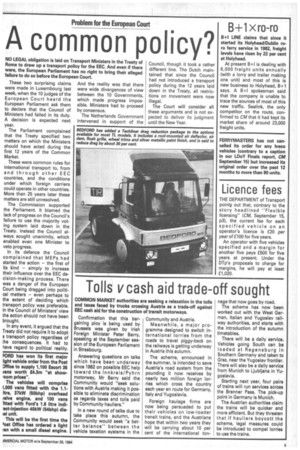A common polic
Page 7

If you've noticed an error in this article please click here to report it so we can fix it.
NO LEGAL obligation is laid on Transport Ministers in Rome to draw up a transport policy for the EEC. And were, the European Parliament has no right to bring failure to do so before the European Court.
These two surprising claims were made in Luxembourg last week, when the 10 judges of the European Court heard the European Parliament ask them to declare that the Council of Ministers had failed in its duty. A decision is expected next year.
The Parliament complained that the Treaty specified two matters on which the Ministers should have acted during the first 12 years of the Common Market.
These were common rules for international transport to, from and through other EEC countries, and the conditions under which foreign carriers could operate in other countries. More than 25 years later these matters are still unresolved.
The Commission supported the Parliament. It blamed the lack of progress on the Council's failure to use the majority voting system laid down in the Treaty. Instead the Council always sought unanimity, which enabled even one Minister to veto progress.
In its defence the Council complained that MEPs had started the action — the first of its kind — simply to increase their influence over the EEC decision-making process. There was a danger of the European Court being dragged into political matters — even perhaps to the extent of deciding which transport policy was preferable. In the Council of Ministers' view the action should not have been brought.
In any event, it argued that the Treaty did not require it to adopt a transport policy regardless of the consequences. It had to have regard to political reality, FORD has won its first major light vehicle order from the Post Dffice to supply 1,100 Escort 35 vans worth E4.3m at show.00m prices".
The vehicles will comprise 1,000 vans fitted with the 1.1. 37kW (50bhp) overhead fahm engine, and 100 vans lifted with Ford's 1.6 litre indivet-injection 40kW (54bhp) dieunit.
This will be the first time the )ost Office has ordered a light ran with a small diesel engine.
And the reality was that there were wide divergences of view between the 10 Governments, which made progress impossible. Ministers had to proceed by consensus.
The Netherlands Government intervened in support of the Council, though it took a rather different line. The Dutch maintained that since the Council had not introduced a transport policy during the 12 years laid down in the Treaty, all restrictions on movement were now illegal.
The Court will consider all these arguments and is not expected to deliver its judgment until the New Year.
















































































































